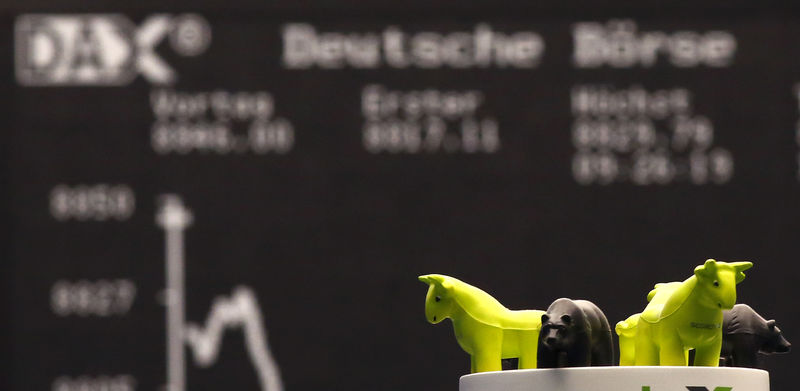This post was originally published on this site

At 02:00 ET (06:00 GMT), the DAX futures contract in Germany traded 0.6% lower, CAC 40 futures in France dropped 0.5% and the FTSE 100 futures contract in the U.K. fell 0.2%.
The U.K. economy contracted by 0.5% on a monthly basis in July, according to data released earlier Wednesday, as 14 rate hikes since late 2021 hurt economic activity.
Industrial production fell 0.7% on the month in July and manufacturing output dropped 0.8%, highlighting the difficulties the country’s industrial base was having as the Bank of England prepares for its latest policy-setting meeting next week.
The BOE is still widely expected to raise interest rates to 5.5% from 5.25%, with wage growth showing few signs of slowing, but this economic slowdown raises the possibility that next week’s hike could mark the end of a tightening cycle which began in December 2021.
Ahead of the BOE, the European Central Bank meets on Thursday with expectation of another quarter-point rate hike rising following a Reuters report that the central bank expects inflation will stay above 3% next year in its updated forecasts, far exceeding the 2% target.
The ECB has raised rates at each of its past nine meetings and another increase of 25 basis points would lift the key deposit rate to 4%.
July eurozone industrial production is due for release later in the session, and is expected to have fallen 0.7% on the month, a drop of 0.3% on an annual basis.
However, the day’s key economic data release will come from the U.S., in the form of the August consumer price index. This should shed further light on the country’s inflation outlook and provide some clarity about future interest rate decisions by the Federal Reserve.
The core CPI, which removes volatile food and energy prices, is expected to cool to 4.3% year-on-year in August from 4.7%, but soaring oil prices point to the headline annual figure climbing to 3.6%, from 3.2% the prior month,
Fed officials have signaled they could pause when they meet later this month, having raised rates at 11 of its past 12 meetings, while they assess their progress so far. But some have cautioned that a pause shouldn’t be interpreted as meaning they are done.
In corporate news, BP PLC (LON:BP) is likely to be in the spotlight after the surprise departure of CEO Bernard Looney late Tuesday for failing to fully disclose details of past personal relationships with colleagues.
Looney was instrumental in pushing the British oil major’s energy transition strategy, and his departure must now call the company’s direction into question.
Oil prices edged higher Wednesday, boosted by the bullish demand outlook from the OPEC monthly report as well as more signs of global supply tightness.
The Organization of Petroleum Exporting Countries, in a report released on Tuesday, said that oil markets will tighten further this year amid robust demand and lower production.
Additionally, the Energy Information Administration said global oil inventories were expected to fall by almost a half million barrels per day in the second half of 2023.
This overshadowed data from the American Petroleum Institute showing that U.S. crude inventories rose 1.2 million barrels last week, suggesting that fuel consumption in the world’s largest economy may be cooling after a strong summer season.
By 02:00 ET, the U.S. crude futures traded 0.3% higher at $89.08 a barrel, while the Brent contract climbed 0.2% to $92.25. Both contracts were sitting close to their highest level since November 2022.
Additionally, gold futures fell 0.2% to $1,931.85/oz, while EUR/USD traded 0.1% lower at 1.0742.

